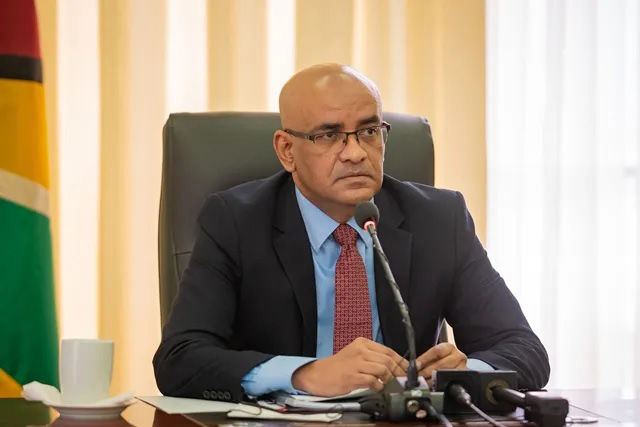Guyana’s climate change plans are not matters on the agenda that will be discussed at the current United Nations Climate Conference, according to Vice President Bharrat Jagdeo, who has said all citizens will have a chance to have their say.
Speaking at a press conference on Monday, Jagdeo pointed out that sections of civil society and former President David Granger have a “mistaken impression” that the plans will be discussed at the COP26 summit being held in Glasgow, Scotland.
“Somehow in the public domain there is an impression created by many — and it is a misguided impression — that these documents will be presented at COP26,” Jagdeo said.
He explained that the agenda on topics for discussion was set ahead of the conference with world leaders and it is impossible to for a country to have the opportunity to discuss its proposed national strategies on the global stage.
“The agenda is set. The issues are defined already so to think you can go there and radically change what is being negotiated is wishful thinking,” Jagdeo said as he responded to criticisms that government failed to meaningfully consult with citizens in preparation for the summit.
Jagdeo quickly pointed out that all Guyanese have four months to submit their views, whether it be technical, popular or other before the document will be finalise by March next year.
Granger, while president, had given the commitment of the country transitioning to 100% renewable energy by 2025. However, Jagdeo said that the current administration had to revise downwards and set a realistic goal since no project is in place to achieve the goal.
The government is now aiming to reduce its carbon emissions by 70% by 2030.
Jagdeo added that Guyana’s revised Nationally Determined Contribution (NDC) will not be submitted at COP26 but until after it has been able to finalise the recently launched expanded Low Carbon Development Strategy (LCDS) after public consultations.
“It means the revised NDCs will not be submitted until after March next year… All of those who are under the mistaken impression that much of what was done in the last couple days is only to be presented to COP, they simply do not understand what takes place at the Conference of Parties negotiations,” he asserted.
A Fair Deal for Guyana, a civil society group, criticised President Irfaan Ali for not consulting the citizens of Guyana in meaningful ways ahead of the summit. “Your government has not consulted us in our communities. We are deeply disappointed by this failure,” it said in a letter sent to Ali.
Jagdeo, however, said the group’s position doesn’t reflect a nuanced understanding of how the negotiations operate. He sought to use the opportunity to explain to how the conference works by stating that the agenda has been set to resolve several issues on from negotiations from various conferences in the previous years.
Jagdeo added that positions on issues can evolve but there are issues that have been on the agenda, which Guyana has been sharing its views on, and those matters are set to be negotiated once again.
He stated that it is only through the solidarity with other countries that a nation would be able to have a major impact in shifting the direction of the trajectory to a specific position.
The contents of negotiations are predetermined, he added, while pointing out that the key elements of the negotiation is to get the developed world to raise its climate ambitions by agreeing to emission cuts in order to achieve net zero greenhouse gas emissions by 2050.
He stated that the negotiating position of Guyana, which falls among the Small Island Developing States, includes having developed countries decarbonising targets earlier than 2050, adequate climate financing, simplified access to climate financing and payment for eco-system services and there must be justice and benefit for the indigenous people.
Countries are meeting in Glasgow to recommit to actions to cut greenhouse gas emissions in keeping with the Paris Agreement, which aims to keep global warming below 1.5 degrees. However, based on the current industrialisation trends the world is far from achieving that target; instead, it is on the road to exceeding that number. According to scientists, the world would have to halve emissions over the next decade and reach net-zero carbon emissions by 2050 if it intends to limit the global temperature rises to 1.5 degrees.
COP26’s website states that as part of the Paris Agreement, every country agreed to communicate or update their emissions reduction targets – their NDC – every five years to reflect their highest possible ambition and a progression over time. These targets set out how far countries plan to reduce emissions across their entire economy and/or in specific sectors.
2020 marked the end of the first of these five-year cycles. This means that countries would have had to update their 2030 targets before heading to Glasgow.






